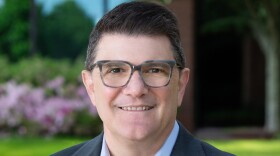Amid all the culture wars and controversies at North Carolina’s legislature, some legislation features Republicans and Democrats quietly working together.
There are plenty of examples of bills developed by lawmakers from both parties working together, ultimately leading to unanimous votes with no debate.
Rep. Laura Budd, D-Mecklenburg, is one of the few Democrats who's sponsored bills that passed the House this year. She joined the WUNC Politics Podcast to talk about how she's developed relationships across the political divide and the legislation she's developed with GOP colleagues.
Budd also spoke about her concerns with the House budget bill, and the awkward moments that come from sharing a last name with a U.S. senator from the same state.
This conversation has been lightly edited for brevity and clarity.
What's your strategy for getting your bills to a floor vote when the Republican majority is ultimately calling the shots?
"A lot of it has to do with having a well-developed idea or concept of what would be good for North Carolina. It's also then identifying the folks on the other side of the aisle who have a potential interest in that same topical area.
"But it's also about having a relationship with them that is outside the four walls in this building — so understanding who they are, where they come from, their families, all of that is really important, especially because politics pits us against one another, especially in such a polarized society where we are now."
As you go about getting these bills through the process, do you ever get a push from Republicans to say, 'well, I'd like to move this bill, but do you think you could vote with me on a veto override,' or something like that?
"I don't get that pressure, and honestly, that makes me respect the fact that when we do make a decision and we're going to move legislation forward, that it is not an outright stated quid pro quo, that there's a level of respect.
"I think a lot of that has to do with defining who you are. I have very definite positions with respect to women's rights and healthcare choices that they get to make. I have very clear positions with regards to DEI and censorship issues."
You've also been trying to foster some bipartisanship outside the Legislative Building. Have there been some social events that you've been involved in to try to bring people together?
"We created the Purple Caucus, and it was the freshman bipartisan caucus (with then-Rep. Caleb Rudow), and we did social events off-site. We did everything from Drive Shack (the golf driving range), and we culminated with skydiving, where Rep. Rudow and Rep. Jarrod Lowry went skydiving together.
"The big push this year is the Joint Legislative Women's Caucus that I really wanted to chair. We have a chair Republican and a chair Democrat in the House and Senate, and our goal is to look at women's issues, things that we get behind as women, to empower women and do things like that."
On the House budget, from your perspective as a Democrat, how does your chamber's budget compare to what passed the Senate in April?
"I think that the House budget is miles ahead of the Senate budget, which is not surprising given how the House and the Senate have operated over the years.
"One of the biggest disappointments in the House budget was the lack of involvement with Democrats. You lose a lot of really good ideas and potential solutions to problems when you exclude someone just because they may define the approach to solving a problem differently."
Listen to the full conversation on the WUNC Politics Podcast.







